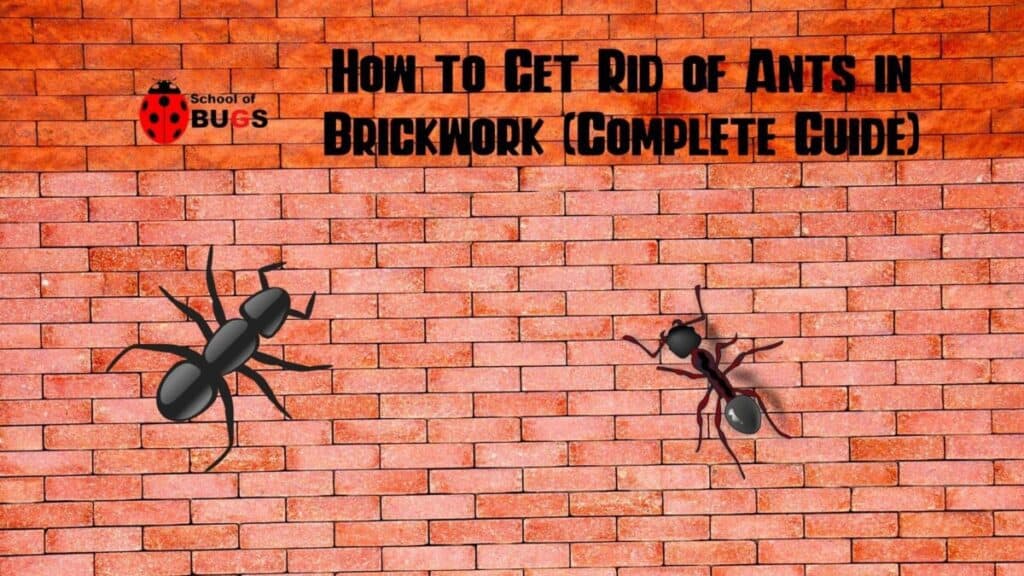
Have you got ants creeping into your brickwork, hollowing it out, and ruining it? If so, you may need to take action to get rid of them, as ants can spread quickly and do surprising amounts of damage at times.
You can get rid of ants in brickwork using a variety of methods, including ant spray, ant baits, insecticides, and even ant dust.
It’s important to take prompt action if you find ants ruining your brickwork, because the longer you leave them for, the more damage they are likely to do.
In this article, we are going to cover:
- How do ants find their way inside your walls?
- How do you know if ants are living in the walls?
- The top methods for killing ants in your walls
- Some natural methods for handling ants
- Ant prevention
How Do Ants Get Inside Your Walls?
If you’re watching a dozen ants appear around one tiny gap in the cement of your brick wall, you might be wondering how they got there in the first place.
These tiny creatures seem to have an amazing ability to show up in odd places, but inside a brick wall might seem incredible.
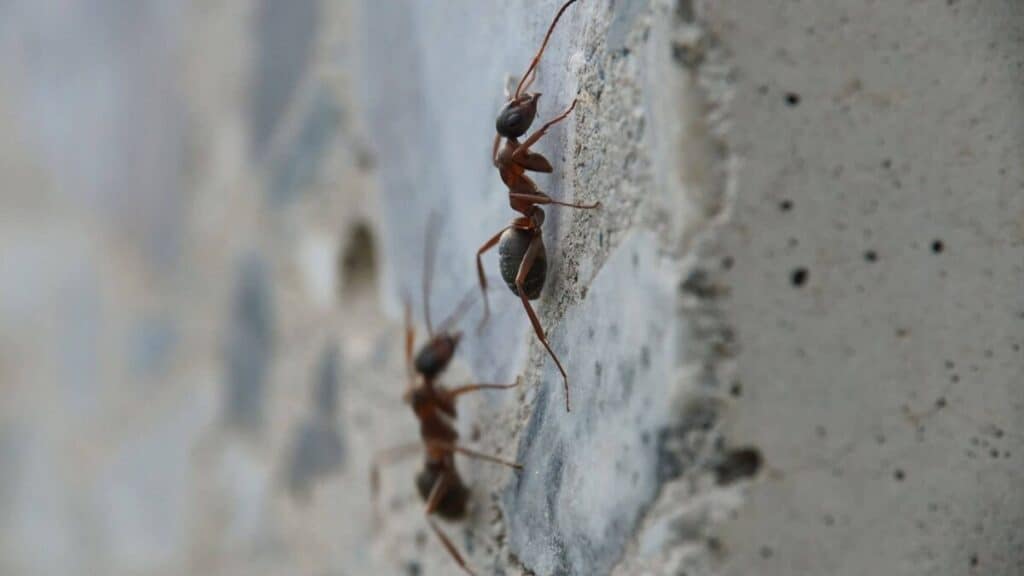
In reality, however, it’s not so surprising. The brick wall offers the ultimate protection from the elements and from predators.
There is no competition from other insects, and little risk of the ant colony being flooded, stomped on, overheated, frozen, or otherwise destroyed.
The bricks provide an insulating layer that keeps out both the heat and the cold, and they protect the ants from predators and accidents.
A brick wall, therefore, offers everything that ants could need, and it’s unsurprising that they find their way into these structures at times.
It’s likely that the ants originally found their way in through a crack or pore in the cement. They will have dug this out, enlarging it, biting the cement and brickwork away.
They have an amazing ability to deal with hard surfaces, and although it may take time, it’s certainly possible for them to work their way into your walls.
Once they have done this, they will hollow out a space for the colony and live there, protected by the bricks.
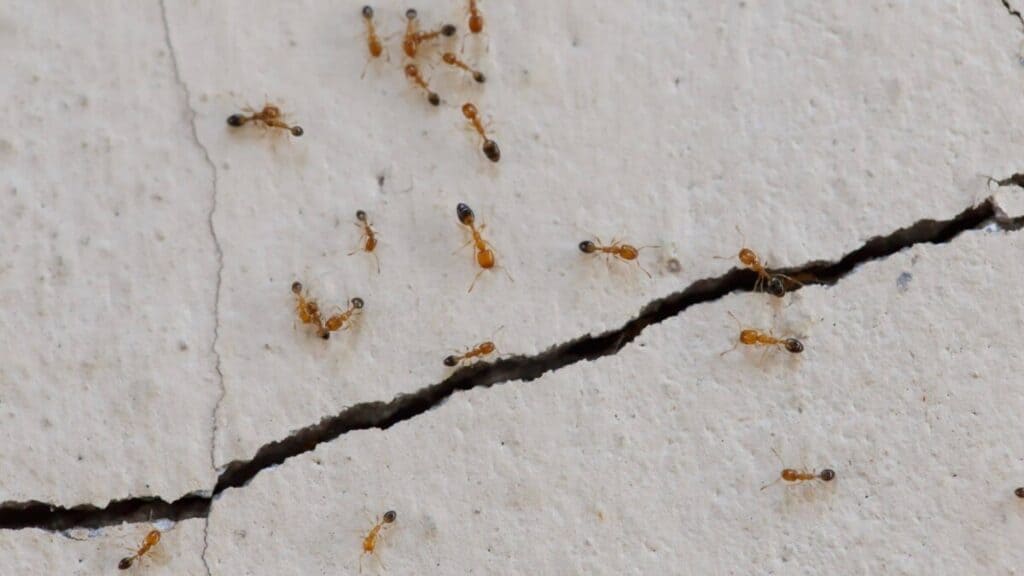
Sometimes, ants may come up from beneath the wall if the foundations have cracks, and sometimes, they will find their way in through the sides of the wall.
They might do this from the outer wall or the inner wall.
They will likely make multiple entry and exit points once they have accessed the wall, so you may never be able to tell how they got into it in the first place.
Even if you find a hole, it may not be their original access point; it could be one that has been created later.
How Can You Tell If Ants Are Living In Your Walls?
Usually, you will know that ants are living in your walls through observation. If you see an ant, watch where it is going.
When it finds food, it will carry it back to the colony – and this shows you where the colony is. If the ant disappears into a crack in a wall, it is likely that the colony lives inside that wall.
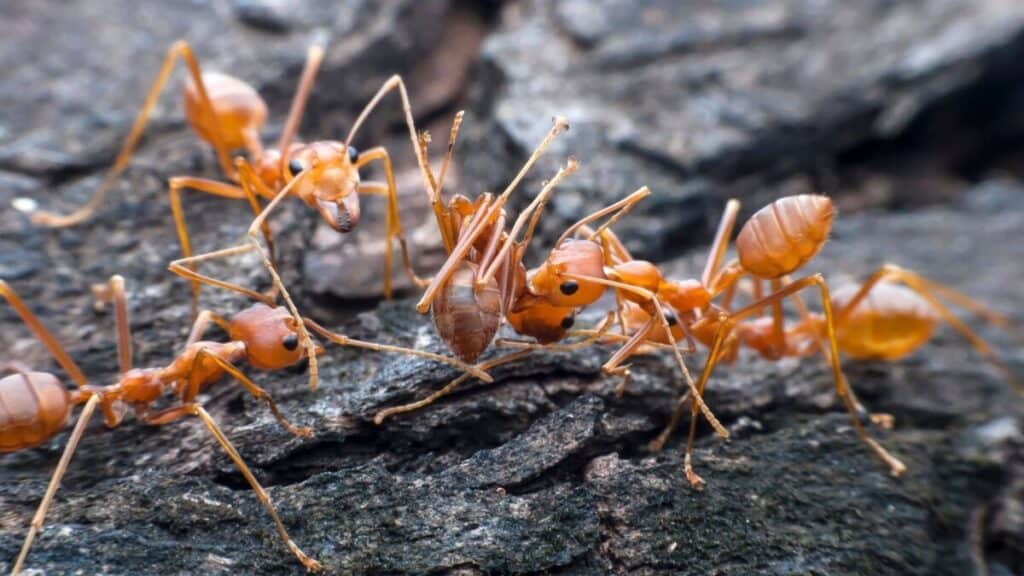
This is particularly true if you see many ants using the same crack, and disappearing and reappearing quickly.
The colony may be deep inside the wall, but you’ll have located at least one entry point that indicates the ants are living in there.
There aren’t usually any other ways to tell, because ants make very little noise.
However, you may find some excavated material at times – piles of dust on the floor are a good indication that ants are excavating within the wall, and they will only do that if they are living there.
What Can You Use To Kill Ants That Are Living In The Wall?
Of course, once you’ve identified a nest in the wall, you’ll want to address it. Unfortunately, you can’t easily get at ants that are living in the wall, so what should you do?
Killing one or two that venture out may not seem like an effective way to deal with the nest.
You will need to poison the ants if they are becoming a nuisance. With exposed nests, you can use insecticide sprays, but this won’t be effective with nests that are hidden inside a wall.
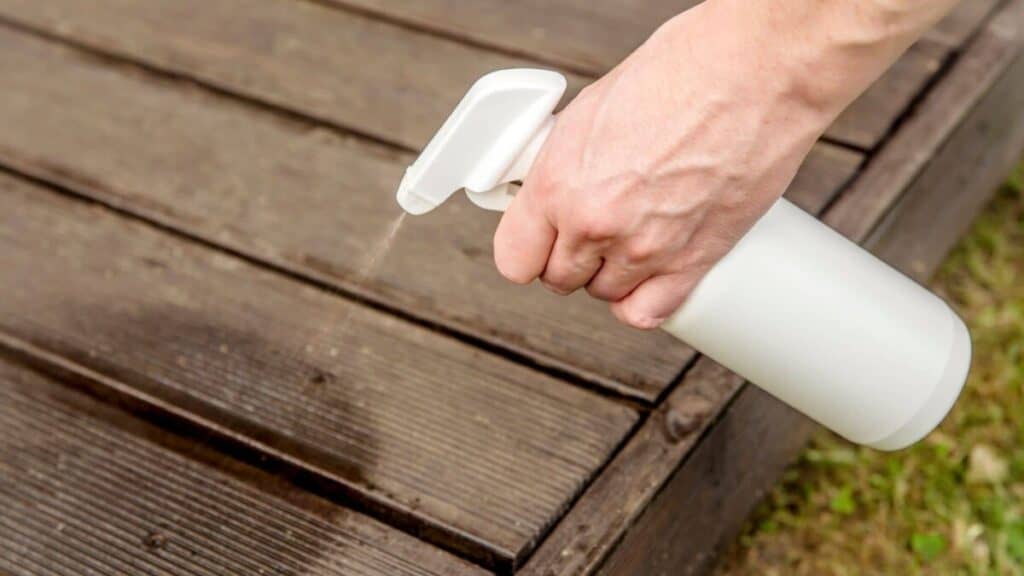
These sprays kill the ants directly on contact, but can only be used on ants that are outside the nest – so the colony will continue to thrive.
You will therefore need to choose a non-repellent slow-working ant killer. This is undetectable to the ants, but will result in a delayed death.
The ant will carry the insecticide back to the colony, spreading it among its fellows, and killing large swathes of the hidden nest.
Alternatively, opt for an ant dust. These can be harder to apply to a wall, but they are often more effective.
Dust along the bottom edges of the wall so that the ants coming down from their entry point are killed. If possible, dust into the ants’ entry hole using a tool; this will spread the poison deep into the colony.
Ant baits are another option. These are food for the ants, laced with poison. If you wish to use these, you’ll have to first establish what your ants eat.
If they prefer sugary substances, choose a sweet-based bait. If they are more interested in proteins, choose a granular one.
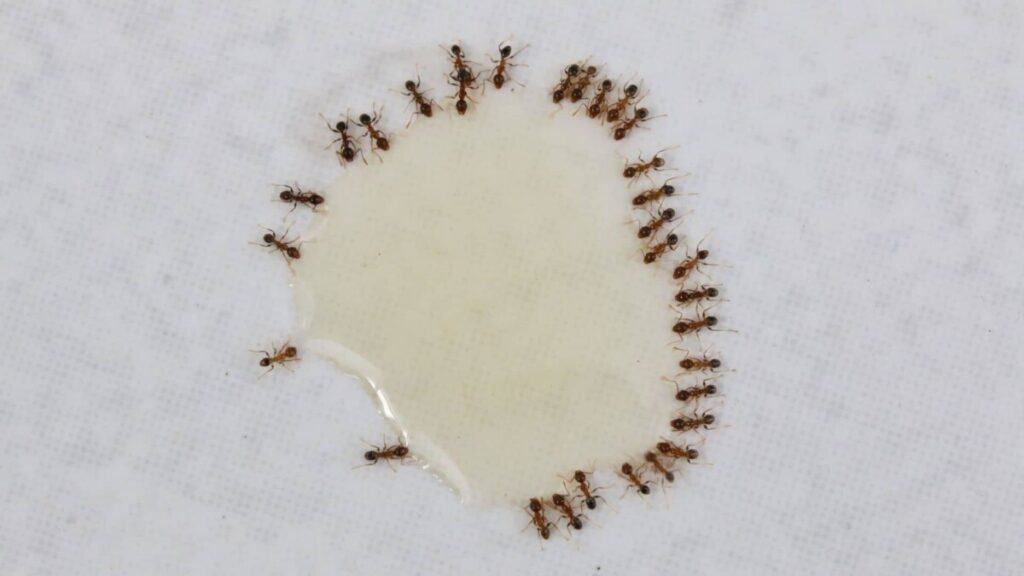
Spread the bait near the ant hole, and they will soon carry it back to the colony, killing it from within. It may take a few days or weeks for this to be effective, but you should gradually see fewer and fewer ants as the colony numbers wane.
If you find that the bait you are using is not having an effect, try swapping to a different option. It helps if you can identify the kind of ant you are dealing with and the food that it prefers.
Natural Ant Killers And Deterrents
Not everyone wants to use chemicals and poisons in their homes, especially with pets or young children around. In these cases, you might want to check out the natural deterrents and ant poisons that you could use.

You will likely have to be more persistent with these, but if you keep trying, you should prevail.
Firstly, find scents that the ants hate. There are plenty of these, as ants use their sense of smell to navigate the world, and are keenly aware of other aromas. Such scents include:
- Peppermint oil
- Tea tree oil
- Orange oil
- Coffee grounds
- Cinnamon
- Vinegar
- Tobacco
Spreading these oils or substances around the ant holes and your surfaces will deter them, but you will need to keep applying them in order for them to be effective.

The aroma will wear off, and the ants will return. Be careful about using essential oils if you have pets.
Some people also find that drawing a line of chalk is effective, as this disrupts the ants’ scent trails. Try drawing chalk circles around the entry points.
If you want to kill the ants, one effective substance is diatomaceous earth, which is a white powder that kills insects by cutting their skins and drying them out.
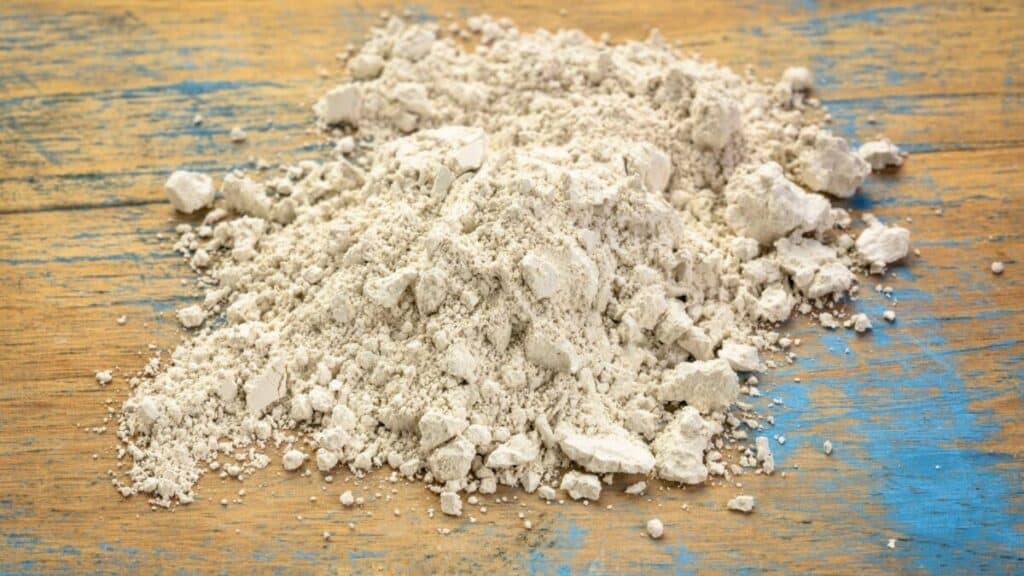
Do not breathe this substance in if you are using it, although it is otherwise harmless to humans.
You can also sprinkle the ants with cornflour, which will smother them, or – if feasible – pour boiling water into their nest. This may be challenging in a brick wall, but it will kill the colony if you are able to do it.
Ant Prevention Methods
Of course, prevention is preferable in most situations, so be vigilant about keeping ants out of your walls in the first place. You can do this in several ways.
Firstly, maintain your walls. Fill cracks and crevices promptly so that the ants aren’t able to find weak points that they can use to start holes.
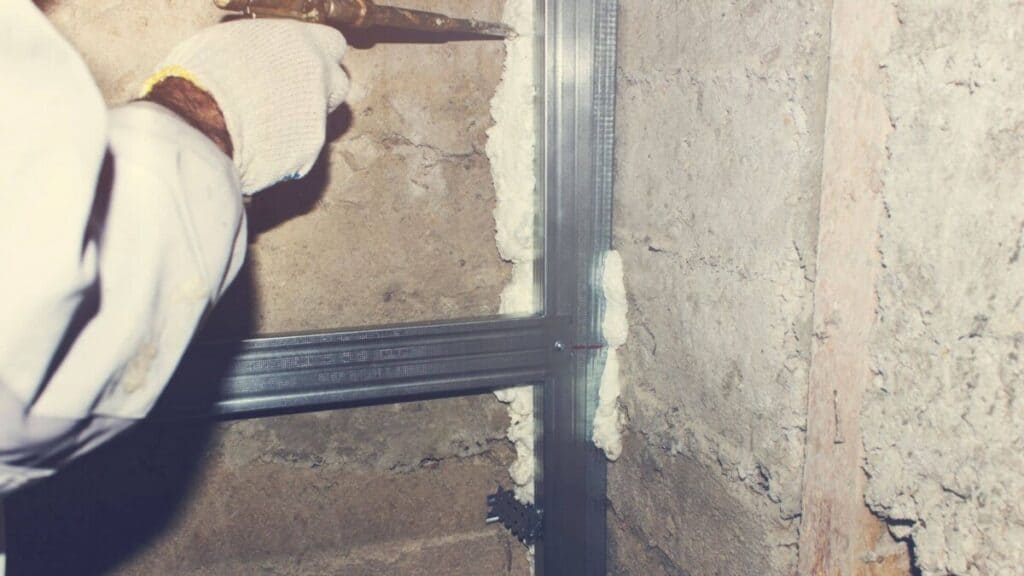
Seal up gaps and maintain them. This will also help to deter other kinds of insects.
Keeping your kitchen clean and free from food smells will also help. Ants are often attracted to the home by the smell of food.
Sticky surfaces, spilled crumbs, open jars, and leftovers will all draw them in, and they will look to make a home near any suitable food source they find.
It can be a challenge to keep a kitchen free from food smells, but the less the ants can find to eat, the less likely they are to want to live in your walls.
Regularly wipe down surfaces, and always clean up the kitchen before you go to bed. Do not leave food out overnight.
Conclusion
Ants in the brickwork can be a nuisance and need to be dealt with promptly so that they don’t damage your home.
If you have found them boring away at your walls, you will probably need to use commercial poisons to kill the colony, but you can try natural methods first, and seal up gaps to discourage the ants from getting in.
Alright, that’s it for this article, here are a few hand-selected articles that you might also find interesting reads:
11 Simple Ways to Get Rid of Ants FastWhat Are Ants Attracted To? Sugar | Plants | Heat | Damp
What Kills Ants Easily? 7 Proven Techniques
Recent Posts
Tiny Black Bugs in Bathroom NO WINGS: What They Are and What to Do!
Finding tiny black bugs in your bathroom can be uncomfortable, to say the least. Especially if they are persistent, or they appear in very large numbers, which they often like to do. When it...
Tiny Black Bugs in Plant Soil - What Are They & What To Do About It
A short horror story: You get a new houseplant. You do your best to take care of it. You’ve ensured that it has the right soil, the right amount of sun, it gets enough water. And then one day, you...

